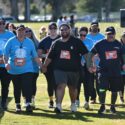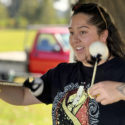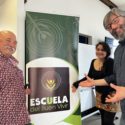An open-hearted model of community development
For nearly 50 years, Upper Hutt’s Ōrongomai Marae has delivered whānau-centred health, community, and social services programmes to anyone in need.
Like Aotearoa itself, the bedrock of this well-established community hub is tikanga Māori and its manaakitanga reflects, respects, and encompasses all.
Its beautiful wharenui, Kahukura, allows whānau from all iwi to embed traditions of tangi, hui, and wānanga into modern urban life. It’s welcomed, and enlightened, pākehā and tauiwi as well.
E Tū Whānau has a long-standing relationship with Ōrongomai Marae, supporting its mahi to strengthen whānau and build community resilience. Recently we caught up with some of the kaimahi and kaumātua whose professionalism and aroha make this open-hearted model of contemporary community development so successful.
Whānau-centred from the beginning
The success of Ōrongomai Marae is firmly rooted in its multicultural values, which mirror the six traditional Māori values of E Tū Whānau.
E Tū Whānau resources and values have actively supported the Ōrongomai Marae mahi and community for many years.
Kaiwhakahaere Matua, Linda Pahi and her whānau were involved early as members of Upper Hutt’s legendary kapa haka group, Māwai Hakona.
Linda has been marae manager since 2007. She now leads a multidisciplinary team of 25 full and part-time kaimahi. Together they co-ordinate a dazzling array of services, programmes, wānanga, and events.
“Ours is a whānau-centred kaupapa. Our doors are open to anyone who needs us, and we work together, mahi tahi, to support positive change in their lives.
Our team is a whānau too. We work together to awhi and strengthen our team and the marae, now and for future generations. Wānanga for whaikōrero, waiata, and mahi ora are a regular part of our succession planning.”
Linda Pahi
Kaiwhakahaere Matua, Linda Pahi, and Whaea Hine Poa at a regular Mahi Ora wānanga for staff and whānau when succession planning was on the agenda.
The marae has a Hauora Health Service, a prisoner reintegration service, a very busy social services team, and a kai bank from where whānau can pick up food as needed or receive deliveries at their homes.
“In addition to our core programmes, we run te reo classes and mau rākau sessions, life skills programmes, and vehicle licensing training. There are counselling and mentoring services and much more, and we welcome anyone who wants to contribute to our community,” says Linda.
Ōrongomai Marae reintegration team builds connection
Eru Fox, Rose Kani, and Eliza Tamihana work together to support men and women in prison, on parole, and those who have recently completed their sentence or are on remand.
Alongside others in the team, Eru works with tāne and wāhine who have been sentenced to two or more years in prison at their Parole Board hearings.
His job is to talk with them and write a report on their behalf, and with their input, on how the social, hauora, and reintegration services of Ōrongomai can work together to help them upon release.
It’s all about whānaungatanga
Prison visiting restrictions require Eru to establish whanaungatanga with his clients via phone calls and video links. These kōrero can develop into trusting, supportive relationships that continue when the clients are released and are rebuilding their lives in the community.
Eru, who was a truck driver for many years before re-training as a social worker, brings life experience and compassion to his work.
“I’m aware of their offending but I don’t know their whole life story.
My job is to build trust with these men and women and awhi them alongside the challenges they face in life,” says Eru.
When Eliza started working in the reintegration team, she was apprehensive about meeting some of the ‘hard men’ who regularly pop into their office to keep in touch with their friend Eru. “But when I met them, well, what do you know. They’re normal,” she says.
Supporting successful reintegration into the community
Eliza’s role is to place clients in jobs or in apprenticeships, and to open doors for them to other educational and life opportunities.
Sometimes clients with special needs, who have never been in trouble, are referred as well.
“It’s not really our job,” says Rose, “but there’s so much need out there in the community and we won’t turn whānau away.”
Rose is a qualified addiction counsellor and is experienced working in government agencies and NGOs. She makes sure her marae clients get the benefits they’re entitled to and the support they need to overcome barriers like illiteracy, health problems and, commonly, addiction issues.
All three kaimahi work together, and across the Ōrongomai team, to tailor solutions for their clients. They live locally and have strong relationships throughout the community which they call upon to help those they serve.
They all agree that trust and mutual respect are vital, but that the most important thing of all is whanaungatanga, being connected.
“It’s keeping in touch, sending a text, making regular visits if they’re in prison and welcoming them into our office on the marae whenever they want to visit us,” says Eru. It’s a people thing. Its whānaungatanga.”
E Tū Whānau supports Ōrongomai Marae to awhi the recovery and restoration of whānau affected by violence, addiction, or adversity and to provide them with long-term healing and improved wellbeing. The goals are strong, resilient communities where whānau are supported to live violence-free and eliminating family harm for the next generation. Te mana kaha o te whānau – The strength and power of the whānau.



